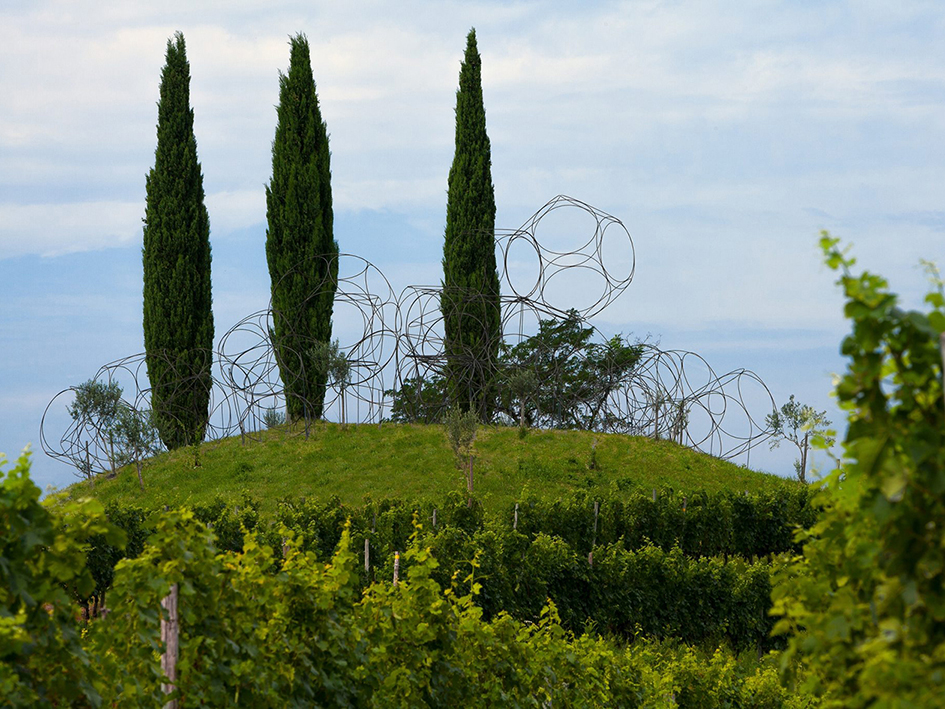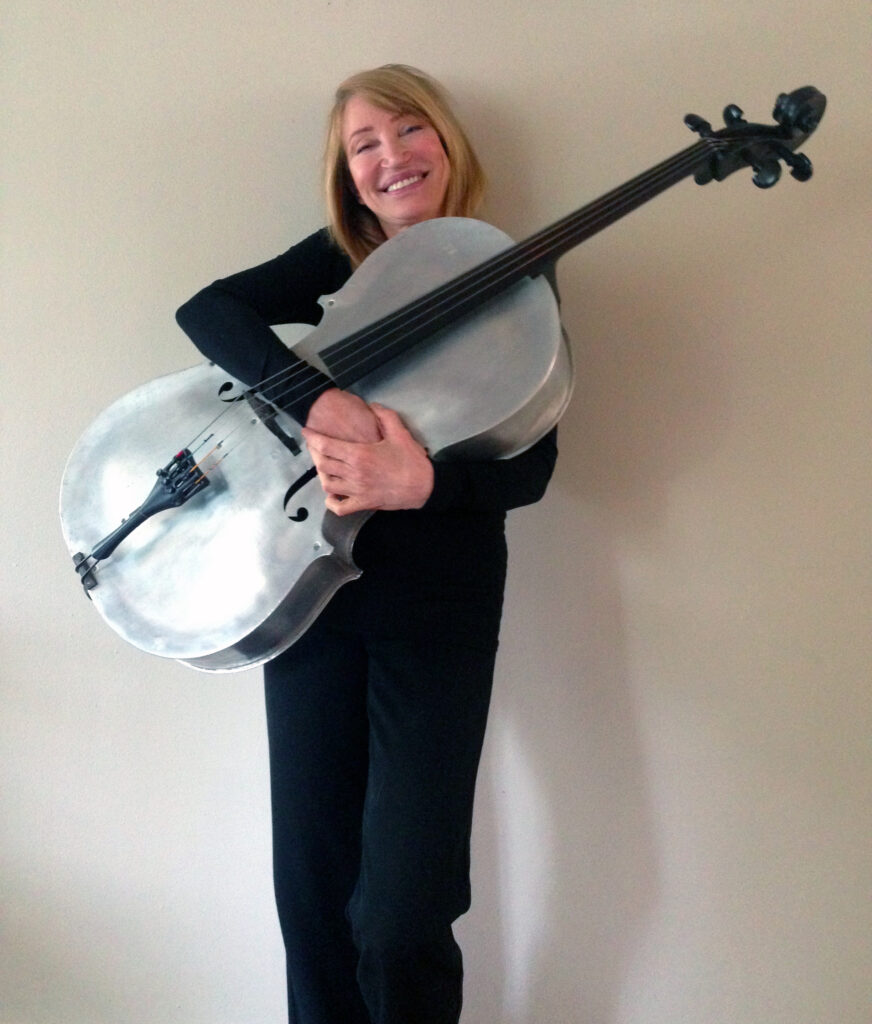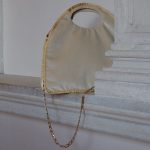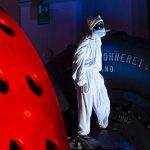Scroll down for English version
Ephemera
festival di cultura immateriale
II edizione
“Verso Atlantide”
La seconda edizione del Festival Ephemera riattiverà nuovamente il Friuli Venezia Giulia con un ricco programma interdisciplinare composto da laboratori diretti da artisti e ospiti internazionali; momenti di alta formazione sviluppata con istituti di ricerca, associazioni e imprese culturali, istituzioni e fondazioni nazionali e internazionali; eventi performativi dedicati a danza, musica, teatro contemporanei.
Nella mappa diffusa del festival rientra nuovamente il Vigne Musuem con “Ephemera in Vigna” che quest’anno dedicherà il palcoscenico naturale composto dai vigneti incorniciati dal progetto artistico architettonico di Yona Friedman e Jean-Baptiste Decavèle a Frances Marie Uitti, compositrice e violoncellista statunitense che nomi autorevoli della musica hanno definito “la violoncellista sperimentale più influente al mondo”.
Elenora Cedaro, responsabile della sezione performativa del festival, co curatrice insieme a Michela Lupieri e Rachele D’Osualdo, ci racconta in anteprima cosa accadrà:
Æ – Partiamo dal titolo così suggestivo, cosa vuole evocare?
EC – “Verso Atlantide” porta con sé un moto, un’azione, un processo in accadimento. È una ricerca che si fa assieme verso l’immateriale necessario della cultura. Penso che il desiderio condiviso con Rachele e Michela sia di proporre un pensiero sul contemporaneo di alta qualità artistica nella sua specifica pragmatica e storicità, non ripiegato su una riflessione autoreferenziale. Stiamo attraversando un momento che pone a individui e collettività delle domande molto urgenti, dolorose, complesse.
Stiamo attraversando un momento che pone a individui e collettività delle domande molto urgenti, dolorose, complesse.
All’indomani di una pandemia, in mezzo a una catastrofe climatica, a guerre vicine e lontane che muovono moltitudini di uomini e donne Ephemera tenta di fare quello che pensiamo possa e debba essere il lavoro di civiltà della cultura: osservare la sterminata distesa delle acque del diluvio confusionale che sta montando. Uno sguardo che non propone soluzioni ma che è attento ai segnali, che contribuisce a provocare un impercettibile moto sulla superficie – perché quello che possiamo fare è solo tentare una mappa di navigazione, pur senza sapere dove sia sprofondata Atlantide.
All’indomani di una pandemia, in mezzo a una catastrofe climatica, a guerre vicine e lontane che muovono moltitudini di uomini e donne Ephemera tenta di fare quello che pensiamo possa e debba essere il lavoro di civiltà della cultura: osservare la sterminata distesa delle acque del diluvio confusionale che sta montando. Uno sguardo che non propone soluzioni ma che è attento ai segnali, che contribuisce a provocare un impercettibile moto sulla superficie – perché quello che possiamo fare è solo tentare una mappa di navigazione, pur senza sapere dove sia sprofondata Atlantide.
Più che “effetto farfalla” mi piace pensare a Ephemera come un “effetto libellula”: un volo rapido, fragile e quasi trasparente rasente all’acqua che leggermente ne increspa la superficie e riflette il sottile filo di continuità – e di responsabilità, mi viene da dire – che un’azione culturale provoca.
Æ – Quali sono le particolarità e i temi focali della seconda edizione di Ephemera?
EC – Verso Atlantide parte dalla “Sorgente”, in Canal del Ferro fra le Prealpi Carniche, defluisce nel Mabul – il diluvio, la crisi – sui Colli Orientali del Vigne Museum di Rosazzo e per arrivare all’Arca urbana di Palazzo Lantieri di Gorizia ed espandersi verso Venezia, Udine e Trieste.
Elena Mazzi e Marco Stefanelli – lei artista visiva, lui sound artist, condurranno le loro residenze artistiche, curate da Michela Lupieri e Rachele D’Osualdo, in un piccolissimo paese nelle aree interne montane del Friuli Venezia Giulia. Moggio Udinese, che conta poco più di 1600 abitanti, ha la particolarità di preservare da generazioni una “spiaggia segreta”, un pozzo costruito dagli alpini durante la prima guerra mondiale a puro scopo ludico e ricreativo, preservato e tenuto in vita dalle persone del paese per la stessa funzione e desiderio. Riuscite a immaginare dei soldati sul confine nord orientale durante l’inferno della Prima Guerra Mondiale che decidono di costruire una piscina con i sassi del fiume fra le felci e i ciclamini solamente per il piacere di poter condividere un luogo di svago con i civili ? È una storia meravigliosa di umanità cocciuta. E sono le comunità che abitano i territori montani, dimenticati da uno sviluppo autodistruttivo e urbanocentrico che si prendono cura di far esistere le fragili realtà indispensabili: ogni giorno testimoniano e agiscono quasi segretamente questa persistenza, esistono pur senza una ricaduta produttiva a impatto immediato, e si rendono necessari alla vita e al destino di tutto il resto – e di tutti noi, che siamo scesi a valle.
Æ – La tua ricerca sempre rivola alla sperimentazione musicale che rasenta la performance, coinvolgendo grandi maestri/e della musica internazionale, ha portato alla collaborazione l’anno scorso con Alvin Curran e quest’anno con Frances Marie UItti, compositrice e violoncellista statunitense che nomi autorevoli della musica hanno definito “la violoncellista sperimentale più influente al mondo”. Ephemera in Vigna sarà la parentesi che la ospiterà a Rosazzo, il 23 giugno. Cosa sta preparando Uitti per il Vigne Musuem? Durante il sopralluogo qui sono state le sue prime impressioni?
EC – La bellezza gentile e rigorosa del museo senza porte di Yona Friedman ha subito attivato la creatività di Uitti che sta immaginando una performance specificatamente pensata per il Vigne Museum, in dialogo con i ritmi della struttura e il profilo del paesaggio che la accoglie. La musica risuonerà tra le colline e i vigneti, gli eterei cerchi di ferro di Friedman si specchieranno sul violoncello di alluminio di Uitti.
La bellezza gentile e rigorosa del museo senza porte di Yona Friedman ha subito attivato la creatività di Uitti che sta immaginando una performance specificatamente pensata per il Vigne Museum, in dialogo con i ritmi della struttura e il profilo del paesaggio che la accoglie. La musica risuonerà tra le colline e i vigneti, gli eterei cerchi di ferro di Friedman si specchieranno sul violoncello di alluminio di Uitti.
A inizio primavera ho avuto il privilegio di accompagnarla sulla collina per un sopralluogo assieme a Elda Felluga, che ha aggiunto la componente inscindibile del desiderio che ha portato a voler realizzare il Vigne Museum. Inutile dire che è stato amore a prima vista, e non solo per una location obiettivamente mozzafiato ma per tutto ciò rappresenta e restituisce.
Mi piace pensare che Ephemera possa mettere in rete luoghi tanto belli quanto amati e desiderati, penso che in questi luoghi sia fondamentale riuscire a proporre scelte di alta qualità artistica, anche se inusuali – e a volte molto diverse dalla zona di comfort e di “conosciuto” a cui ci abituano le programmazioni culturali.
Mi piace pensare che Ephemera possa mettere in rete luoghi tanto belli quanto amati e desiderati, penso che in questi luoghi sia fondamentale riuscire a proporre scelte di alta qualità artistica, anche se inusuali – e a volte molto diverse dalla zona di comfort e di “conosciuto” a cui ci abituano le programmazioni culturali.
E con questo non voglio dire che bisogna a tutti i costi cercare “lo strano”, stupire con esotismi o effetti speciali. Penso serva un onesto rigore nel tentare di fare scelte di qualità. Per quanto fuori dagli schemi qualcosa di bello ripagherà sempre e toccherà un pubblico decisamente non solo di addetti ai lavori: lo scorso anno con la performance di Curran lo abbiamo visto, sono certa che quest’anno ci aspetterà una serata altrettanto indimenticabile.
Æ – Volendo preparare il pubblico a questa performance così dirompente, cosa si può dire?
EC – Uitti è un’artista internazionalmente riconosciuta tra i grandi, perciò la prima cosa da dire è semplicemente preparatevi a una serata di eccezionale musica. E poi, altrettanto importante, preparatevi a godere un luogo unico, che appoggia le solide e leggere strutture di cui è fatto su uno smisurato gesto d’amore. Sarà una serata che probabilmente proporrà qualcosa che non vi aspettate ma che pensiamo sarà capace di mettervi a parte della poesia e dell’intensità di una performance di altissima qualità. Sarà un viaggio sonoro per violoncello, grilli e fruscio del vento fra i cipressi e le vigne, da ascoltare seduti o distesi sull’erba (e sì! Portate una copertina e lo spray antizanzare, vestitevi comodi, diffidate dai tacchi alti… a proposito di “qui e ora” e di pragmatica: Vigne Museum è un museo per il paesaggio che sta in mezzo alla sua campagna. Site specific è anche scarpe giuste e attenzione al contesto).
Sarà un viaggio sonoro per violoncello, grilli e fruscio del vento fra i cipressi e le vigne, da ascoltare seduti o distesi sull’erba
Æ – Rimane consolidato il team con Michela Lupieri e Rachele D’Osulado che con te hanno gestito, ognuna per le sue competenze, la ideazione e programmazione della seconda edizione del festival. Forti di un’esperienza di collaborazione pregressa cosa vi aspettate da questa edizione?
EC – Ephemera è un Cerbero – anzi una Cerbera! – per nulla crudele e orgogliosamente diversa poiché dalle peculiarità di ognuna di noi trae la sua forza e ricchezza. Tre teste, altrettante competenze specifiche e tre grandi passioni che si sostengono, si contaminano, che faticano e si divertono nel progettare una cultura che parli del e al contemporaneo. Con Rachele e Michela cerchiamo di immaginare un festival che stia in dialogo con il territorio regionale con una visione capace di andare oltre alla specificità locale, anche grazie al contributo di una rete di partner culturali e di finanziatori privati ed istituzionali che ne hanno davvero compreso e sposato le finalità. Da questa edizione ci aspettiamo di consolidare quello che abbiamo costruito e di rendere sempre più fattiva la collaborazione fra due realtà come ETRARTE e Vigne Museum – due associazioni culturali, ci tengo a ricordare, di quel terzo settore senza il cui lavoro la maggior parte della vita culturale sul territorio semplicemente non esisterebbe.
Da questa edizione ci aspettiamo di consolidare quello che abbiamo costruito e di rendere sempre più fattiva la collaborazione fra due realtà come ETRARTE e Vigne Museum – due associazioni culturali, ci tengo a ricordare, di quel terzo settore senza il cui lavoro la maggior parte della vita culturale sul territorio semplicemente non esisterebbe.
Ephemera
festival of intangible culture
II edition
“Toward Atlantis”
The second edition of the Ephemera Festival will once again reactivate Friuli Venezia Giulia with a rich interdisciplinary program consisting of workshops directed by international artists and guests; moments of higher education developed with research institutes, associations and cultural enterprises, national and international institutions and foundations; and performance events dedicated to contemporary dance, music, and theater.
The widespread map of the festival once again includes the Vigne Musuem with “Ephemera in the Vineyard,” which this year will dedicate the natural stage composed of vineyards framed by Yona Friedman and Jean-Baptiste Decavèle’s architectural art project to Frances Marie Uitti, an American composer and cellist whom influential names in music have called “the world’s most influential experimental cellist.”
Elenora Cedaro, head of the festival’s performance section and co-curator with Michela Lupieri and Rachele D’Osualdo, gives us a preview of what’s to come:
Æ – Let’s start with the title so suggestive, what is it meant to evoke?
EC – ”Toward Atlantis” carries with it a motion, an action, a process in happening. It is a search together toward the necessary immaterial of culture. I think the desire shared with Rachele and Michela is to propose a thought about the contemporary of high artistic quality in its specific pragmatics and historicity, not folded into a self-referential reflection. We are going through a moment that poses very urgent, sorrowful, complex questions to individuals and communities. In the aftermath of a pandemic, in the midst of a climate catastrophe, of wars near and far that move multitudes of men and women Ephemera attempts to do what we think can and should be the civilizational work of culture: to look at the boundless expanse of the waters of the confusing deluge that is mounting. It is a gaze that does not propose solutions but is alert to the signs, helping to cause an imperceptible motion on the surface — for what we can do is only attempt a navigational map, while not knowing where Atlantis has sunk. Rather than a “butterfly effect,” I like to think of Ephemera as a “dragonfly effect”: a swift, fragile and almost transparent flight skimming the water, slightly rippling its surface and reflecting the thin thread of continuity – and responsibility, I would think – that a cultural action provokes.
Æ – What are the special features and focal themes of the second edition of Ephemera?
EC – Towards Atlantis starts from the “Source,” in Canal del Ferro among the Carnic Pre-Alps, flows into Mabul-the flood, the crisis-in the Eastern Hills of the Vigne Museum of Rosazzo and to arrive at the Urban Ark of Gorizia’s Palazzo Lantieri and expand towards Venice, Udine and Trieste.
Elena Mazzi and Marco Stefanelli – she a visual artist, he a sound artist, will conduct their artistic residencies, curated by Michela Lupieri and Rachele D’Osualdo, in a tiny village in the mountainous interior areas of Friuli Venezia Giulia. Moggio Udinese, which has just over 1,600 inhabitants, has the distinction of preserving for generations a “secret beach,” a well built by the Alpine troops during World War I for purely recreational and playful purposes, preserved and kept alive by the people of the village for the same function and desire. Can you imagine soldiers on the northeastern border during the hell of World War I deciding to build a pool out of river stones among ferns and cyclamen solely for the pleasure of being able to share a recreational place with civilians ? It is a wonderful story of stubborn humanity. And it is the communities that inhabit the mountain territories, forgotten by self-destructive and urban-centric development, that take care to make the fragile indispensable realities exist: every day they witness and act almost secretly this persistence, they exist even though without a productive spillover with immediate impact, and they make themselves necessary to the life and destiny of everything else – and of all of us, who have descended to the valley.
Æ – Your research always aimed at musical experimentation bordering on performance, involving great masters of international music, led to last year’s collaboration with Alvin Curran and this year with Frances Marie UItti, an American composer and cellist whom influential names in music have called “the world’s most influential experimental cellist.” Ephemera in the Vineyard will be the interlude that will host her in Rosazzo, June 23. What is Uitti preparing for the Vigne Musuem? During the site visit here were her first impressions?
EC – The gentle and rigorous beauty of Yona Friedman’s museum without doors immediately activated the creativity of Uitti, who is envisioning a performance specifically designed for the Vigne Museum, in dialogue with the rhythms of the structure and the contours of the landscape that welcomes it. Music will resonate among the hills and vineyards, Friedman’s ethereal iron circles mirrored on Uitti’s aluminum cello. In early spring, I had the privilege of accompanying her to the hillside for an inspection together with Elda Felluga, who added the inseparable component of the desire that led to wanting to create the Vigne Museum. Needless to say, it was love at first sight, and not only for an objectively breathtaking location but for all that it represents and gives back.
I like to think that Ephemera can network places that are as beautiful as they are beloved and desired, I think that in these places it is essential to be able to propose choices of high artistic quality, even if unusual – and sometimes very different from the comfort zone and “known” that cultural programming accustoms us to. [And by this I do not mean that one must at all costs seek “the strange,” amaze with exoticism or special effects. I think there is a need for honest rigor in trying to make quality choices. No matter how out of the box something beautiful will always pay off and will touch an audience decidedly not just of insiders: last year with Curran’s performance we saw that, I am sure that this year a similarly unforgettable evening awaits us.
Æ – Preparing the audience for such a powerful disruptive performance, what can you say?
EC – Uitti is an internationally recognized artist among the greats, so the first thing to say is simply get ready for an evening of exceptional music. And then, just as important, get ready to enjoy a unique venue that rests its strong and light structures on an immeasurable gesture of love. It will be an evening that will probably offer something you do not expect but that we think will be able to set you apart from the poetry and intensity of a performance of the highest quality. It will be a sonic journey for cello, crickets and wind rustling among the cypresses and vines, to be listened to while sitting or lying on the grass (and yes! Bring a blanket and mosquito spray, dress comfortably, be wary of high heels…speaking of “here and now” and pragmatics: Vigne Museum is a museum for the landscape that stands in the midst of its countryside. Site specific is also about right shoes and attention to context).
Æ – The team remains consolidated with Michela Lupieri and Rachele D’Osulado, who with you managed, each for her skills, the conception and programming of the second edition of the festival. Fortified by previous collaborative experience, what do you expect from this edition?
EC – Ephemera is a Cerberus – indeed a Cerbera! – not at all cruel and proudly different as it draws its strength and richness from the peculiarities of each of us. Three heads, as many specific skills and three great passions that support each other, contaminate each other, struggle and have fun in designing a culture that speaks of and to the contemporary. With Rachele and Michela we try to imagine a festival that is in dialogue with the regional territory with a vision capable of going beyond the local specificity, also thanks to the contribution of a network of cultural partners and private and institutional funders who have really understood and espoused its aims. From this edition we expect to consolidate what we have built and to make the collaboration between two realities such as ETRARTE and Vigne Museum – two cultural associations, I would like to remind you, of that third sector without whose work most of the cultural life in the territory would simply not exist.




